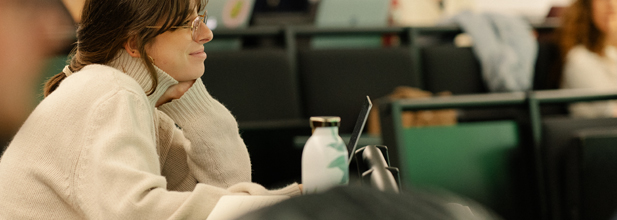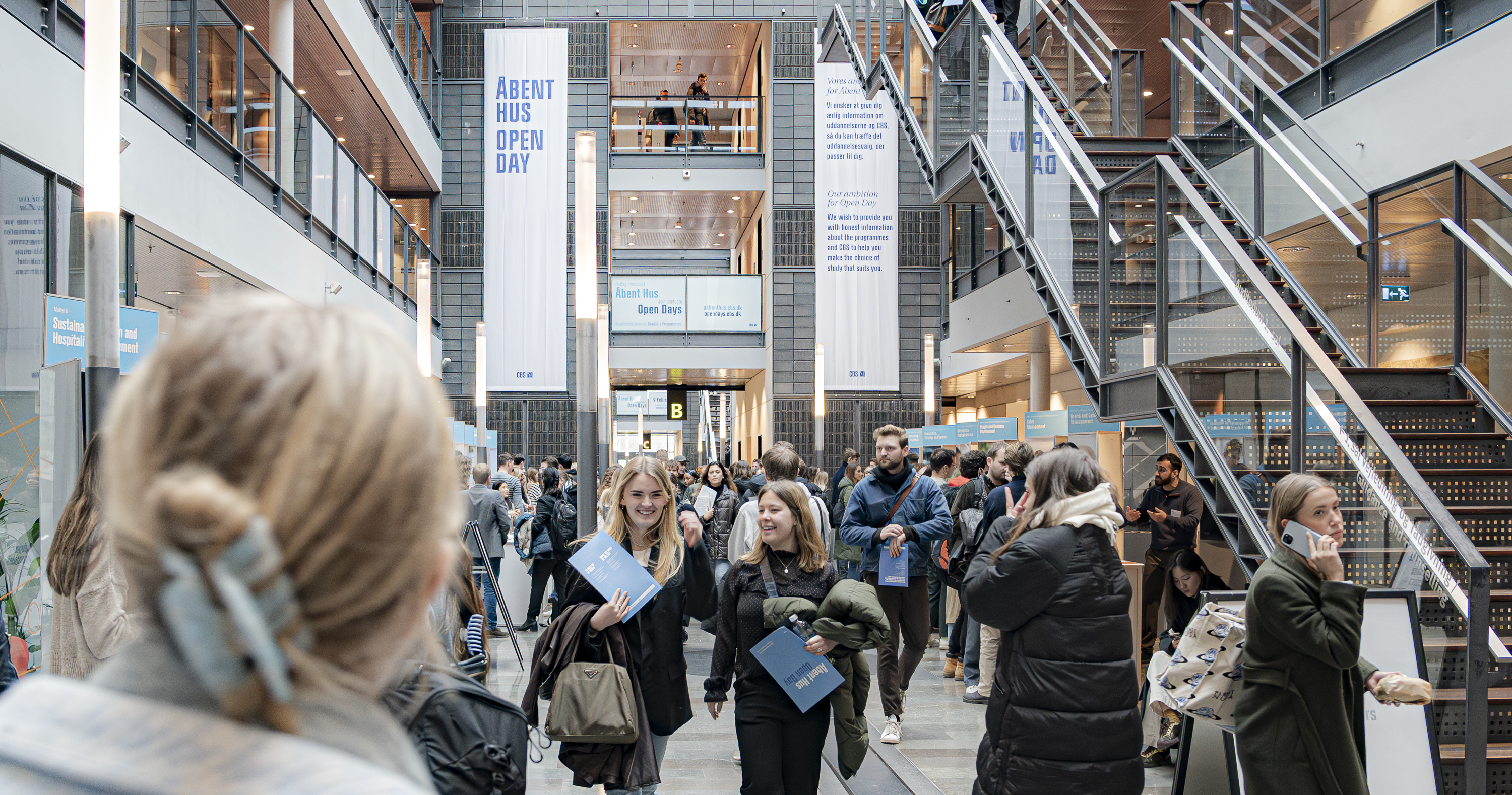MSc in Business Administration and Bioentrepreneurship
About the programme
MSc in Business Administration and Bioentrepreneurship, BIO, is a full-time two year programme. The programme offers Denmark's first university degree and academic courses bridging business and biotech. BIO is a cooperation between Copenhagen Business School (CBS), The Technical University of Denmark (DTU Systems Biology) and University of Copenhagen (KU) and leading life science firms in Denmark.
BIO is a platform for collaboration on biobusiness teaching, involving CBS in partnership with the Danish Technical University, and University of Copenhagen. Partnerships also include leading life science firms in Denmark, Scandinavia and the Nanyang Technical University in Singapore. The master in bioentrepreneurship enrolls students with a life-science background. Business students can enroll into courses as single electives, or combined into a minor in Bioentrepreneurship.
Cross disciplinary skills and real- life projects
The mix of life science and business students in BIO classes gives you an opportunity to build cross disciplinary skills and networks.
Developed in close cooperation with industry, the BIO programme gives you a unique opportunity to apply your skills to actual business challenges in real-life entrepreneurship projects, and in the business activities of leading life science firms. You may develop these skills when conducting both curricular activities and extra-curricular activities. The extracurricular activities are currently being supported by the Novo Nordisk Foundation.
Transform research to business
The life science industry is a key driver in the Danish economy and more globally. To maintain momentum, the sector needs innovation and entrepreneurship to build new firms and to create new business in existing firms. In life-science, the steps of transforming research into business are complicated. To handle this transformation, you must both understand the science behind new developments, and also master methods and tools in finance, marketing, intellectual property right, business model design and much more. The integration of life-science and business skills is highly useful for life-science firms, and for this reason, Denmark’s leading companies have played a main role in starting and shaping BIO.

First year: Advanced biology and biotechnology
Enrolment requires a bachelor in biology/biotechnology. The first year of the master’s programme allows you to further develop skills and insights into advanced biology and biotechnology. Course packages of 60 ECTS, meeting first year’s requirements, are offered by The University of Copenhagen and the Danish Technical University. You may also take your first year of biology/biotechnology at any Danish or international university offering an equivalent course package.
To determine in advance if your courses meet our first year requirements, please send full course descriptions to our programme administration for approval to: credit-bio@cbs.dk
You may already have completed biology/biotechnology courses meeting first-year requirements at a Danish or an international university. In this case, you may enroll directly into the second year of the programme.
Read more about how to apply for enrollment at the second year
The second year of the programme is taught exclusively at CBS. In the second year, courses and project work at CBS train you in the business skills required to translate bio-innovation into start-up firms and life science firms. You learn to combine your previous training in life science with the concepts and tools for business analysis.
Mandatory courses on your third semester
Third semester courses include topics like innovation management, market understanding, finance and bioentrepreneurship.
Master thesis
In your fourth and final semester you complete an master thesis activity. You may organise an internship in a life science company in the Copenhagen region within biotech, pharma of industrial bio. The internship is optinoal and you must organise it yourself. Your thesis may present a systematic, in depth analysis of selected issues you may have encountered if you have completed an internship.
What to consider
Meeting ground between life-science and business students
At the beginning, it may be challenging for life-science students to get into the issues of business analysis and to develop a business mindset. Some students find it challenging to read literature on management and business economics. These challenges are surmountable if you keep an open-mind towards new issues and your fellow students with different backgrounds. You will also find it helpful to pick up as much information as possible from the rich exposure you get to experts and experience from industry.
Interest in the biotech industry an passion for business
If you consider applying for BIO, it is essential that you have an interest in the biotech industry and have a passion for entrepreneurship and business.
Studying in English
If you do not have a bachelor’s degree taught in English, we recommend that you read more about what to consider before applying for an English taught programme.
Read more about Teaching and litterature in English on Teaching and working methods.
Study environment
Small cohort
A maximum of 30 students are enrolled per year. Therefore, the students time with faculty is unusually high, and many students develop strong working relationships with their professors. You will get to know everyone in your class, and there is a good environment for working in groups and exchanging knowledge both in and outside the classroom.
Different backgrounds
The study environment offers an opportunity to train your interdisciplinary skills. Students from life-science degrees work closely with business students on assignments and projects. Initially, it may be challenging for life-science students to adjust to another academic language, and to work together with students with a different mindset. However, the different backgrounds of student is one of the most valuable aspects of the study environment in BIO.
Student life at CBS
Studying at CBS is much more than just preparing for and going to classes.
At CBS, there are more than 20,000 students with different backgrounds and nationalities. Teamwork is an essential part of studying at CBS both in classes and in extracurricular activities.
With more than 100 student organisations, you also have plenty of opportunities to engage and connect with students across programmes and classes.
Learn more about the vibrant student life at CBS, the student organisations, and the international environment on Student life
For internationals
If you are an international student, we have gathered a lot of information about what it is like to be an international student at CBS and how you can prepare for life in Denmark.
Read more on For internationals
Teaching and exams
Teaching
The combination of a small number of motivated students, and professors who are passionate and highly recognised within their academic fields, creates a unique learning environment. As a student you are expected to prepare for and participate actively in class.The attitude and contribution of the students is key to a good learning environment and high output.
To a large extent classes are based on co-teaching, involving both CBS and industry faculty. Courses make use of real-life case work, creating lots of interaction between students and teachers. The programme also includes a three-month internship in a leading life-science company. This will give you a unique mix of analytical and practical skills, and a strong background for building your career in the life science industry.
Read more on Teaching and working methods
Exams
At CBS each course is concluded with an examination. The courses are structured in quarters, and therefore exams take place in end-October, December/January, mid March, and May/June. The typical exam forms are oral exams, in some courses based on a mini-project and 4 hour written exams.
The programme is concluded with a master's thesis that builds on the practical issues you have addressed during your internship and your bioentrepreneurship project.
Read more on Exams at CBS
Time consumption
You should know that it is demanding to study in a graduate programme, and both the curriculum and workload is significantly higher than at bachelor level.
If you are studying on a full-time graduate programme, you should expect spending approximately 37 hours on average on your studies each week. The workload will vary during the year.
The time leading up to assignment submissions and exams can be hectic, and you can easily work more than 40 hours a week in this period. Preparing for oral exams can be especially time consuming, because you have to be able to explain and discuss the covered concepts and theories and learn things by heart.
Read more on Teaching and working methods
Student job
Most programmes are quite flexible in terms of combining studies with a student job. Most students work a maximum of 15 hours a week in order to have sufficient time for their studies.
Studying in Denmark - for internationals
If this is your first time studying in Denmark, you may find teaching and exam formats, the grading scale and the academic calendar very different from what you are used to.
Read about everything you need to know as an international student studying at CBS on For internationals > Academic information
Career
What gets you the job?
As a graduate in bioentrepreneurship you will learn skills valuable for starting up your own company and be able to handle a broad range of tasks in life-science companies that develop and launch new products and services.
Bioentrepreneurs are the link between life-science and business.
Career opportunities
With a master’s degree in bioentrepreneurship you can manage the following tasks in Denmark as well as abroad:
- Market analysis and planning
- Valuation and finance
- Innovation and IPR
- Management of biotech companies regarding its finances , organiation and governance
- Development of large sales and collaboration projects (business development)
Job functions:
- Entrepreneur
- Strategy Manager
- R&D Manager
- IPR Manager
- Consultant
- Project Manager
Industry:
- Biotech
- Industrial Biotech
- Pharma
- Life Science
- Health
- Food Processing
Competence profile
In the competence profile you can read more about the purpose of the programme and the competencies you achieve in the programme:
Competence profile for MSc BIO
Course overview
|
1st semester |
2nd semester |
3rd semester |
4th semester |
|
|
Courses* 30 ECTS
|
Courses* 30 ECTS
|
5th quarter | 6th quarter |
|
| Finance and Accounting in BioBusiness (7,5 ECTS) |
Innovation Challenges in BioBusiness (7.5 ECTS) |
|||
| Biomarkets (7.5 ECTS) |
BioEntrepreneurship (7.5 ECTS) |
|||
*You can find an overview of the 1st year and course descriptions in the programme regulations for MSc in Business Administration and Bioentrepreneurship.





